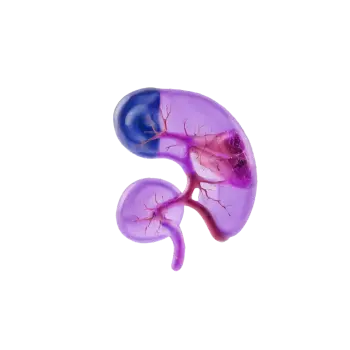What is polycystic kidney disease (ADPKD)?
ADPKD stands for autosomal dominant polycystic kidney disease and is the most common inherited kidney disease. It is caused by mutations in genes that control the growth and development of kidney cells, most often in PKD1 or PKD2. The disease causes hundreds to thousands of cysts to form in both kidneys, which can cause the kidneys to become severely enlarged and eventually lose their function.
Common symptoms of ADPKD
- Pain in the back, sides or abdomen – often related to large cysts or infections.
- High blood pressure – one of the earliest and most common symptoms.
- Hematuria (blood in the urine) – may be visible or microscopic.
- Urinary tract infections – especially renal pelvic infections are common.
- Kidney stones – occur in some patients.
- Enlarged, palpable kidneys – especially in advanced disease.
- Gradual decline in kidney function – which in some cases leads to kidney failure.
What causes ADPKD?
The disease is hereditary and follows an autosomal dominant inheritance pattern. This means that a person with a mutated gene has a 50% risk of passing the disease on to their children. In most cases, ADPKD is caused by mutations in:
- PKD1 (about 85% of cases) – often leads to faster disease development.
- PKD2 (about 15% of cases) – has a slower course.
In rare cases, the disease can occur spontaneously without a family history (new mutation).
How is the diagnosis made?
Diagnosis is based on a combination of clinical findings, imaging and sometimes genetic testing.
Investigations in case of suspicion of ADPKD:
Imaging- Ultrasound – the first step to detect cysts in the kidneys. The number of cysts and the patient's age are used for diagnostic criteria.
- Computed tomography (CT) or magnetic resonance imaging (MRI) – provides more detailed information about the size of the kidneys, the number of cysts and any complications.
- S-creatinine – to assess kidney function (GFR).
- S-urea – to supplement the assessment of the kidneys' excretory capacity.
- Urine dipstick – may show blood or protein.
- Urine culture – if infection is suspected.
Can be used in cases of unclear diagnosis, especially in young patients without clear family history or for family planning.
Treatment of ADPKD
There is currently no cure, but the disease can be slowed down and complications treated. The focus is on protecting kidney function and preventing complications.
Common treatment principles
- Blood pressure control – ACE inhibitors or ARB are recommended to reduce the risk of kidney failure.
- Fluid intake – plenty of fluids can prevent cyst growth.
- Treatment of infections – antibiotics for urinary tract infections or cyst infections.
- Pain management – for pain from cysts or kidney stones.
Specific drug treatment
Tolvaptan is a drug that slows cyst growth and preserves kidney function in some patients with rapidly progressing disease. It is used under specialist supervision and requires liver function checks.
Advanced renal failure
- Dialysis treatment – in case of end-stage renal failure.
- Kidney transplantation – an option for many patients with advanced ADPKD.
Prognosis
ADPKD is a chronic condition with a slow progression. Many patients first experience symptoms in adulthood, and about half develop renal failure by the age of 50–60. Early diagnosis, good blood pressure control and lifestyle measures can delay the development of the disease. Genetic counseling may be appropriate for affected families.




















